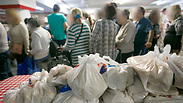
Survey shows one in five Israelis suffer from food insecurity
Survey conducted by the organization Latet reveals that 20% of respondents did not eat balanced meals in the last year and 14% could not buy more food due to economic hardships.
One in five Israeli citizens suffers from food insecurity as a result of economic difficulties, according to the results of a survey conducted by 'Latet,' (To Give). Other data accumulated by the National Insurance Institute shows that 100,000 families (approximately 400,000 people) suffer from food insecurity in Israel.
The survey was conducted among 500 respondents and revealed that 20% did not eat balanced meals in the last year due to economic hardship, while 14% indicated that the amount of food they bought was insufficient, but lacked the money to purchase more.
The survey also found that 78% of the public view the government as the responsible entity for alleviating poverty, while 66% believe that actually dealing with poverty has little-to-no national priority. This opinion is more widespread among the secular and traditional population segments, as well as those with higher education.
In a survey conducted by the Rotem Institute for advanced market research, the public also gave scores on a 1-10 scale for decision makers. The minister of finance and minister of social affairs and services both received failing scores for their perceived inept handling of poverty. Minister of Welfare and Social Services Haim Katz received a score of 3.9, Minister of Finance Moshe Kahlon received a score of 4.4 and Prime Minister Benjamin Netanyahu was ranked the lowest at just 2.9.
Officials in the Ministry of Social Affairs and Services strongly criticized the report and survey, saying they "question the reliability of the message and the credibility of the survey. This is an organization full of economic interests, some of which aren't even related to wanting to help those in need."
In February 2014, the National Insurance Institute issued a NIS 500 million plan and a series of recommendations on how to resolve the problem of poverty. In recent months, more than two years after submitting the recommendations, the Ministry of Social Affairs and Services has been promoting an experimental plan to combat the issue. However, only NIS 40 million has been utilized and gone toward 10,000 families.
Latet recently held an exhibit dubbed "the unattainable meal," which will continue in Rabin Square until September 24th. The organization released a statement about the display saying, "The exhibit is designed to visualize the fact that for hundreds of thousands of families in Israel, even a basic meal or holiday dinner is not often affordable in light of the economic situation. The aim of the campaign is to raise public awareness and change the situation."










.jpg)
